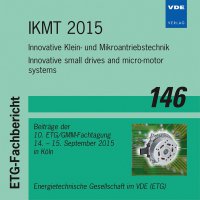Influence of voltage harmonics and cogging torque on speed deviations of servo drives with permanent magnet synchronous motors
Conference: IKMT 2015 - 10. ETG/GMM-Fachtagung Innovative Klein- und Mikroantriebstechnik
09/14/2015 - 09/15/2015 at Köln, Deutschland
Proceedings: IKMT 2015
Pages: 5Language: englishTyp: PDF
Personal VDE Members are entitled to a 10% discount on this title
Authors:
Fraeger, Carsten (Hochschule Hannover / University of applied sciences and arts, Ricklinger Stadtweg 120, 30459 Hannover, Germany)
Abstract:
The paper describes the influence of EMF harmonics and cogging torque on speed deviations of servo drives with PMsynchronous motors. A whole range of different production machines has high requirements in terms of low speed deviations, e.g. printing machines, laser cutting machines, tooling machines and applications with path traversing. A servo drive consists of a permanent magnet synchronous machine with an angle sensor, a PWM inverter, and a current and speed controller. The voltage harmonics produce torque oscillation, an so does the cogging torque. Due to this, the harmonics and the cogging lead to speed oscillations. This paper analyzes the influence using a dynamic model for the drive and the controller. The dynamic model simulates the speed of the drive in dependence on the gains of the controller as well as the value of harmonics and cogging. Numerical simulations are made with a synchronous servo motor with a rated torque of 2.8 Nm at 3800 1/min , and a maximum torque of 11.6 Nm. The simulations are done with various EMF harmonics and cogging torques. The speed deviation is calculated on the basis of the difference of highest and lowest speeds. In summary, the cogging torque is the main influence on speed deviations at low speeds whereas the voltage harmonics cause the major portion of the speed deviations at high speeds.


